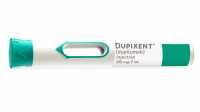Author Interviews, Dermatology, FDA, Regeneron, Sanofi / 31.07.2020
FDA Approves Dupixent® (dupilumab) Pre-Filled Pen For All Indications in Patients Aged 12 Years and Older
MedicalResearch.com Interview with:
Elizabeth Laws, PhD
Vice President and Global Project Head for Dupilumab/Dupixent
Sanofi
Marcie Ruddy, MD, MA
Strategic Program Direction, Immunology and Inflammation
Regeneron
Dr. Laws and Dr. Ruddy discuss the FDA approval of a 300 mg single-dose pre-filled pen for Dupixent® (dupilumab) for all indications in patients aged 12 years and older.
MedicalResearch.com: What is the background for this announcement? What are the main indications for Dupixent?
Response: Until now, Dupixent 300 mg dose was available only in pre-filled syringe for administration. The approval of the pre-filled pen provides an additional, easy-to-use option for patients to self-administer Dupixent.
Dupixent is approved to treat patients aged 6 years and older with uncontrolled moderate-to-severe atopic dermatitis (AD) and can be used with or without topical treatments. Dupixent is also approved for use with other medicines for the maintenance treatment of uncontrolled moderate-to-severe eosinophilic or oral steroid dependent asthma in patients aged 12 years and older, and with other medicines for the maintenance treatment of uncontrolled chronic rhinosinusitis with nasal polyposis (CRSwNP) in adults, respectively.
The pre-filled pen is approved for use in patients prescribed Dupixent who are 12 years of age and older across current indications, at the 300 mg dose. (more…)

